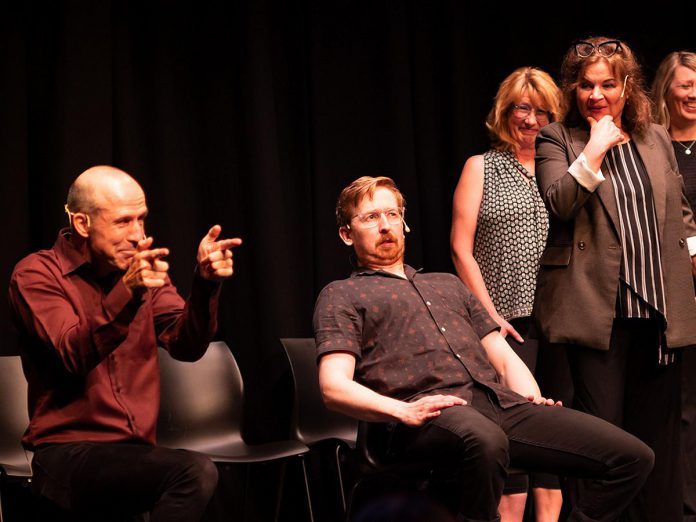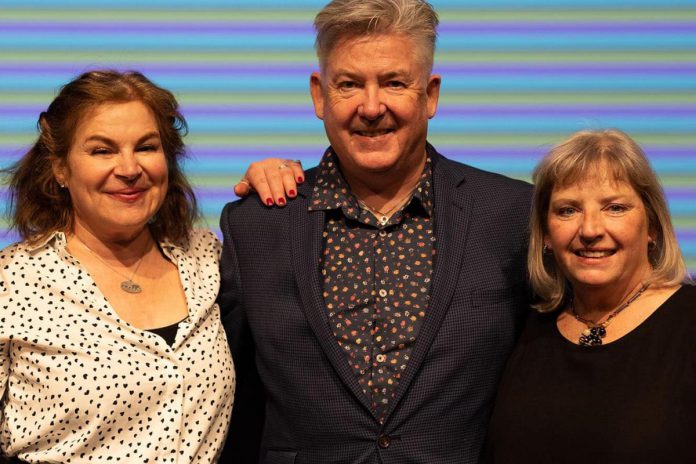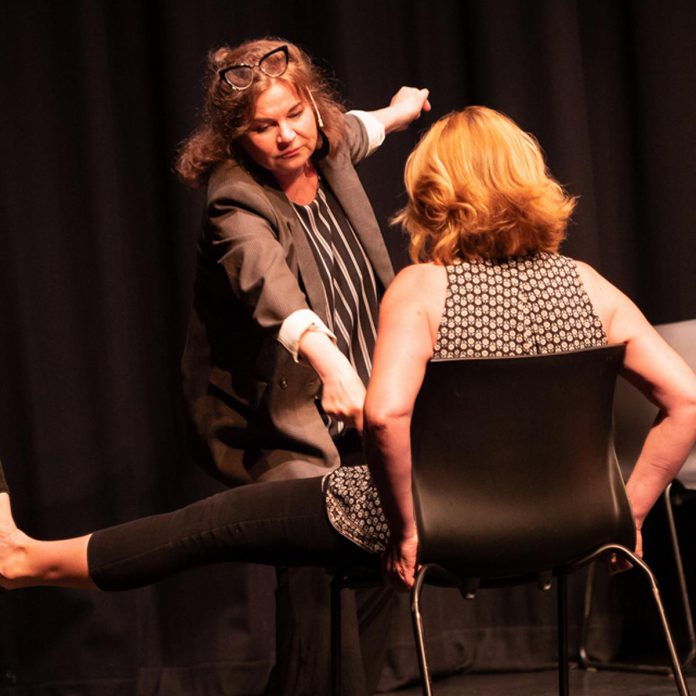
On its website, klusterfork entertainment puts forth the hard-to-argue-with observation that “Life is a klusterfork,” with the suggested response being “We might as well laugh.”
Since September 2019, the Peterborough-based producer of live improv comedy shows and related adult workshops has not only brought the funny to local audiences but also taught aspiring performers the skills to do likewise.
On Friday, November 15th at the recently reopened Gordon Best Theatre, both sides of that equation will come together in the form of Impros vs. Joes, an evening of improv games and all-round hilarity featuring top Canadian improv performers onstage alongside klusterfork’s “Keep Me Up” improv workshop participants.
Front-and-centre, as they have been since day one, will be acclaimed actress and improv performer Linda Kash and Second City-trained actor and director Pat Maitland, joined by improv professionals including Second City alumni Janet van de Graaf and Kerry Griffin.
Tickets to the 8 p.m. show, which features musical accompaniment by Danny Bronson, cost $20 and are available in advance at www.klusterfork.com or by cash at the door.
Shortly after Kash and Maitland co-founded klusterfork entertainment, award-winning designer and director Ian Burns entered the mix as a partner in the venture. The trio has since produced and presented several Impros vs. Joes shows at the Gordon Best Theatre as well as four Market Hall productions: klusterfork It’s Christmas! (2019), klusterfork It’s Winter! Still. (2020), April Fools’ Gold (2022), and klusterfork School’s Out! (2023).

In the meantime, numerous in-person and (during the pandemic) virtual workshops have not only equipped participants with improv skills but greatly bolstered their confidence to the benefit of their other pursuits.
But Kash’s mentoring dates back further to 2007 when, with her late husband Paul O’Sullivan, she co-founded the Peterborough Academy of Performing Arts, teaching improv and acting skills to children, teens, and adults. Years later, she says her passion for teaching performance skills brings her as much joy as hearty laughter for her own comedic work.
“I’ve found the fountain of youth,” observes Kash. “My dad taught violin to seven year olds until he was 90 years old. It wasn’t just luck. He was around youthful energy. He was around playfulness. I fully intend to be Benjamin Button. It keeps me young. It keeps me in the community. It keeps me feeling vital, and it keeps me challenged.”
Maitland echoes that sentiment, noting performing and teaching are “unbelievably rewarding” for her.
“People say ‘I’m no good at art’ but all kids like doing art and all kids play,” she explains. “I don’t think people lose some kind of ability for it as they grow up. I think they get a little self-conscious or whatever. It really struck home for me during the (pandemic) lockdown. People were saying ‘Thank you for providing this. This is healing.’ That was extremely humbling, and a reminder that if we’re not laughing, there’s really not a lot of point.”
The Impros vs. Joes format is “brilliant,” adds Maitland, noting the first half of the show features workshop students with background support from the seasoned pros. In the second half of the show, the pros do their thing.
“Linda devises a great rundown of games that gives everybody an equal amount of time on their feet. The feedback from the audience is part of the learning (for the newbies).”
For both the pros and those aspiring to be just as spontaneously funny, there is a tie that binds. That common denominator is trust — something that separates improv from other more traditional forms of comedy, such as stand-up.
“Before a show, you pat your partners on the back and say ‘I’ve got your back’,” Kash says. “That speaks to the essence of what great improv is.”

Kash notes the audience also has an important role in improv.
“The audience feels when a scene has peaked. The audience feels, as much as the cast does, when a scene needs some help. That means someone has to leave the scene, or someone has to enter the scene and take focus.”
Knowing when to enter or exit a scene is also an important skill in improv, according to Kash.
“Newbie improvisors are polite and don’t want to interrupt. We basically say we don’t want you to. If it ain’t broke, don’t fix it, so don’t enter the scene if you’re not needed. But by God, 90 per cent of the time you’re needed, so get in there because after 30 or 45 seconds to a minute, something’s got to happen. Something’s got to change. We want the audience to see the magic of this kind of collaborative craft.”
Trust between those on stage, adds Maitland, is key, along with “the feeling of safety.”
“You have to feel safe, both with the skills of your scene partner — that you trust they can help you — and also with the content,” Maitland explains. “As one of our instructors once said, at the beginning (of learning) improv, you’re told to say the first thing that comes into your head. But as you get better at improv, try for the second or third thing.”
“It’s still going to be offbeat and wacky. It’s not always just the easiest answers, which can sometimes be predictable. You need to feel safe that it’s going to be smart and they (other cast members) have your back. That’s an awesome feeling.”

Kash says while the intent of all comedy, improv or otherwise, is to entertain, there’s also a place for the sharing of social commentary.
“I don’t want to be afraid of my point of view — I don’t want to be afraid to let my politics bleed onto the stage a little bit,” she says, admitting to being “a newsie” in terms of staying current on events and those at the centre of them.
“I encourage our students, and our pros, to delve into social commentary, both in our local politics and on a wider scale. But at the same time, there’s nothing like bringing comedy into serious matters to make things more palatable, to make us realize we’re all in this together and we’re all worried about the same kinds of things.”
“We’re here to make you laugh but we’re also here to make you think,” Kash says. “That is important for klusterfork to distinguish itself from other improv companies.”
Both Kash and Maitland extoll the benefits that improv training brings to virtually all other aspects of their workshop participants’ lives.
“I very rarely get embarrassed in life because I’ve been I’ve been on the verge of such incredible embarrassment on stage,” says Kash. “I have built armour that allows me to make mistakes on stage as much as I make mistakes in life. But I forgive the mistakes.”
“I also know that the more I’m in the moment socially and professionally, the more authentic I can be, and the more I forgive myself for not being a genius all the time but being present. Being in the moment, and forgiving mistakes and being generous and listening, are really the tenants of most community situations. Improv training cannot help but help you with anything.”

Maitland adds “there’s so many different reasons” that people sign up for a klusterfork improv workshop.
“Sometimes it’s for confidence. Sometimes they’re a ham but they don’t like memorizing lines, but they need some kind of output. A lot of it is public speaking, sometimes for work. We even have students check to see if their company’s wellness program covers it.”
For those contemplating improv training, Kash offers an encouraging truth she’s learned from experience.
“Anyone can improvise,” she says. “I do think finding your funny bone is, for some people, a more difficult journey than it is for others, but, ultimately, it is possible. I’ve worked with every stripe of human and I’m convinced everyone can be in the moment and improvise and have a sense of play. Whether they’re funny is less a goal than being in the moment.”
Anyone interested in upcoming klusterfork workshop classes can visit www.klusterfork.com.
kawarthaNOW is proud to be a media sponsor of Impros vs. Joes.

























